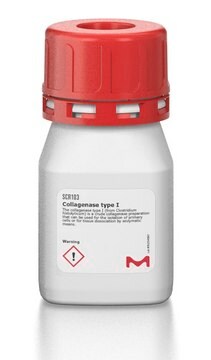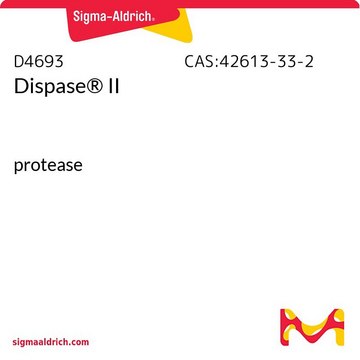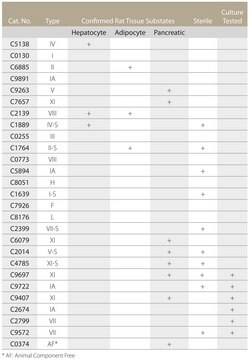C2-BIOC
Collagenase Type II, Cls II
Synonym(s):
Collagen A
Sign Into View Organizational & Contract Pricing
All Photos(1)
About This Item
UNSPSC Code:
12352204
NACRES:
NA.78
Recommended Products
Looking for similar products? Visit Product Comparison Guide
General description
Collagenase Type II (Cls II) is one of the main tissue dissociation enzymes produced by Clostridium histolyticum. It aids to digest the smaller collagen fragments produced by Type I collagenase. Collagenases, a member of the matrix metalloproteinase (MMPs) family, digests collagen in the extracellular matrix (ECM). Collagens are triple helix structural proteins comprising three collagen polypeptides with high tensile strength.
This product is identical to Biochrom GmbH part numbers C2-22 and C2-28. Enzyme blending from collagenase, clostripain, with tryptic and proteolytic activities from Clostridium histolyticum. This preparation shows a high clostripain activity with the tryptic activity close to type I. Suitable for liver, bone, thyroid, heart, and salivary gland tissue. Specific activity is 125 to 250 Mandl units per milligram of powdered substance.
Application
Collagenase Type II (Cls II) has been used:
- as a component of Roswell park memorial Institute (RPMI)-1640 media to digest hepatic tissues
- to perfuse murine heart for the isolation of epicardial stromal cells (EpiSC)
- to digest collagenase and inject it into the intrarenal aorta abdominalis to perfuse the kidneys
Choose from one of the most recent versions:
Certificates of Analysis (COA)
Lot/Batch Number
Sorry, we don't have COAs for this product available online at this time.
If you need assistance, please contact Customer Support.
Already Own This Product?
Find documentation for the products that you have recently purchased in the Document Library.
Tissue dissociation enzymes for adipose stromal vascular fraction cell isolation: a review
Lockhart RA, et al.
Journal of stem cell research & therapy (2015)
Lukas Peintner et al.
Autophagy, 17(9), 2384-2400 (2020-09-25)
Mutations in the PKD1 gene result in autosomal dominant polycystic kidney disease (ADPKD), the most common monogenetic cause of end-stage renal disease (ESRD) in humans. Previous reports suggested that PKD1, together with PKD2/polycystin-2, may function as a receptor-cation channel complex
Our team of scientists has experience in all areas of research including Life Science, Material Science, Chemical Synthesis, Chromatography, Analytical and many others.
Contact Technical Service






